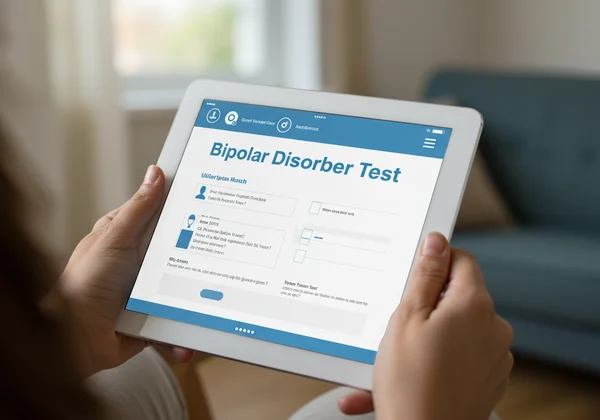Bipolar Disorder Test Insights: 10 Lifestyle Tips for Mood Stability
November 13, 2025 | By Leo Vance
Experiencing significant mood swings can be a deeply confusing and exhausting journey. If you're grappling with these powerful shifts, you might be asking, how do you get tested for bipolar disorder? and actively seeking ways to find balance. While a professional diagnosis from a healthcare provider is the only definitive way to confirm bipolar disorder, adopting daily lifestyle strategies can make a significant difference in your well-being. These habits can complement professional care and help you build a foundation for emotional resilience. Understanding your emotional patterns is a critical first step, and a confidential Bipolar Disorder Test can offer valuable preliminary insights. This confidential bipolar disorder test serves as an initial step, not a diagnosis. For a better understanding of your own experiences, you can start your journey today.

Essential Bipolar Mood Stability Tips: Building a Strong Foundation
Creating stability begins with the small, consistent choices you make every day. Think of these foundational habits as the bedrock upon which you can build lasting emotional wellness. They are simple yet profound actions that regulate your body's natural rhythms, directly impacting your mood and energy levels.
The Power of Routine: Stabilizing Your Day
For a mind that experiences intense shifts, structure and predictability can be incredibly grounding. Establishing a consistent daily routine helps regulate your internal body clock (circadian rhythm), which plays a significant role in mood. Try to wake up, eat your meals, and go to bed at roughly the same time each day, even on weekends. This simple act creates an anchor in your day, reducing the chaos that can often trigger or worsen mood episodes. A predictable schedule provides a sense of control and safety, making it easier to manage energy levels and emotional responses.
Sleep Hygiene for Bipolar Disorder: Prioritizing Better Moods
Sleep and bipolar disorder have a deeply interconnected relationship. Disrupted sleep can be both a symptom and a trigger for manic or depressive episodes. Therefore, practicing good sleep hygiene is non-negotiable. Create a relaxing bedtime ritual: turn off screens at least an hour before bed, make your bedroom dark and cool, and avoid caffeine or heavy meals in the evening. Aiming for 7-9 hours of consistent, quality sleep each night is one of the most powerful things you can do to protect your mental health and promote mood stability.

Empowering Changes: Practical Bipolar Lifestyle Adjustments
Beyond the basics of routine and sleep, certain lifestyle adjustments can empower you to actively manage your mental health. These changes involve being more mindful of what you put into your body and how you process stress, giving you more tools to navigate daily challenges.
Nutrient-Rich Diet: Fueling Mental Wellness
The connection between your gut and your brain is undeniable. While no specific diet can "cure" bipolar disorder, focusing on a balanced, nutrient-rich diet can support overall brain health. Emphasize whole foods like fruits, vegetables, lean proteins, and healthy fats rich in omega-3s (like salmon and walnuts), which have been shown to support cognitive function. Conversely, try to limit processed foods, excessive sugar, and caffeine, as they can lead to energy crashes and potentially exacerbate mood swings. Consistent meal times also help stabilize your blood sugar and energy levels throughout the day.

Mindfulness & Stress Reduction for Bipolar Symptoms
Living with mood volatility is inherently stressful, and stress itself is a major trigger for mood episodes. Developing effective stress reduction techniques is crucial. Mindfulness meditation, deep-breathing exercises, and yoga are proven methods for calming the nervous system. Even just five minutes of focused breathing can lower your cortisol levels and bring you back to the present moment. By practicing mindfulness, you can learn to observe your thoughts and feelings without judgment, creating a crucial space between an emotion and your reaction to it. Taking a free online screening tool can also help reduce the stress of uncertainty by providing clarity.
Sustainable Strategies: Coping with Bipolar Daily
Long-term stability involves developing a toolkit of sustainable coping strategies. These are the practices that help you ride out the difficult moments, celebrate the good ones, and build a life that feels meaningful and balanced, regardless of your diagnosis.
Exercise for Mood: Finding Your Rhythm
Regular physical activity is a potent mood stabilizer. Exercise releases endorphins, which have mood-boosting effects, and it can help alleviate symptoms of both depression and anxiety. The key is to find a form of movement you genuinely enjoy, whether it's a brisk walk in nature, dancing in your living room, swimming, or cycling. Consistency is more important than intensity. Aim for about 30 minutes of moderate activity most days of the week to help regulate your energy, improve sleep, and build resilience.
Cultivating a Strong Support System
Bipolar disorder can feel incredibly isolating, making a strong support system essential. This network can include trusted family members, loyal friends, a therapist, or a support group. Don't be afraid to be open with the people who care about you about what you're experiencing. Let them know how they can help, whether it's by being a listening ear, helping you stick to your routine, or recognizing early warning signs of a mood shift. Connecting with others who share similar experiences can also provide validation and reduce feelings of loneliness.

Setting Realistic Goals & Managing Expectations
During manic phases, it's easy to take on too much, leading to burnout and a subsequent crash. During depressive episodes, even small tasks can feel monumental. Practice self-management by setting small, achievable goals each day. Instead of "clean the entire house," aim for "load the dishwasher." Celebrating these small victories can build momentum and self-esteem. It's about progress, not perfection. Be kind to yourself and adjust your expectations based on how you feel each day.
Journaling for Emotional Insight and Tracking
Keeping a daily mood journal is a powerful tool for gaining emotional insight. By tracking your moods, sleep patterns, energy levels, and daily activities, you can begin to identify patterns and potential triggers for your mood swings. This log provides invaluable information for both you and your healthcare provider. It helps you understand your unique experience with bipolar disorder and empowers you to make proactive choices. This self-awareness is the first step toward effective management, a process that can begin with a confidential self-screening.
Limiting Triggers: Identifying and Avoiding Stressors
Through journaling and self-reflection, you can start to identify your personal trigger management plan. Triggers are specific events, situations, or substances that can provoke a mood episode. Common triggers include interpersonal conflict, high-stress environments, substance use (especially alcohol and recreational drugs), and significant life changes. While you can't avoid all stress, identifying and developing strategies to either avoid or cope with your specific triggers is a cornerstone of long-term mood stability.
Embracing Stability: Your Path Forward
Living well with bipolar disorder is a continuous journey, not a fixed destination. These ten lifestyle tips offer practical ways to support your well-being, working alongside any professional treatment you pursue. They're about empowering you to build a more stable and fulfilling life, one step at a time.
Remember, the first and most crucial step is understanding what you're dealing with. If you recognize yourself in these challenges, gaining clarity is within your reach. Taking a free, confidential online screening is a proactive and courageous way to begin. It can provide the initial insights needed to have a more informed conversation with a healthcare professional. Take our free bipolar disorder test today to take that important first step.
Common Questions About Bipolar Disorder Tests & Management
Can lifestyle changes alone manage bipolar disorder? While lifestyle changes are incredibly important for supporting mood stability and overall well-being, they are generally not sufficient to manage bipolar disorder on their own. Bipolar disorder is a complex medical condition that typically requires a comprehensive treatment plan, often including medication and therapy, as determined by a qualified healthcare professional. Lifestyle strategies should be seen as a crucial complement to professional care, not a replacement.
What are the first steps after noticing potential bipolar symptoms? If you're noticing significant mood swings or other potential symptoms, the first step is to gather information in a safe, confidential way. Using a reliable online bipolar disorder screening tool can help you organize your experiences and provide a clear starting point. The next critical step is to schedule an appointment with a doctor or mental health professional to discuss your results and undergo a comprehensive evaluation.
Where can I find a reliable bipolar screening test online? You can find a free, confidential, and science-informed screening tool right here. Our online bipolar disorder test is designed based on established psychiatric screening principles, such as the Mood Disorder Questionnaire (MDQ), to help you identify potential signs of bipolar disorder.
Is there a test for bipolar disorder that provides a definitive diagnosis? No online test can provide a definitive diagnosis. A formal diagnosis of bipolar disorder can only be made by a qualified healthcare professional, such as a psychiatrist or psychologist, after a thorough clinical evaluation. Online screenings are valuable preliminary tools that can indicate whether you should seek a professional assessment, but they are not a substitute for it.